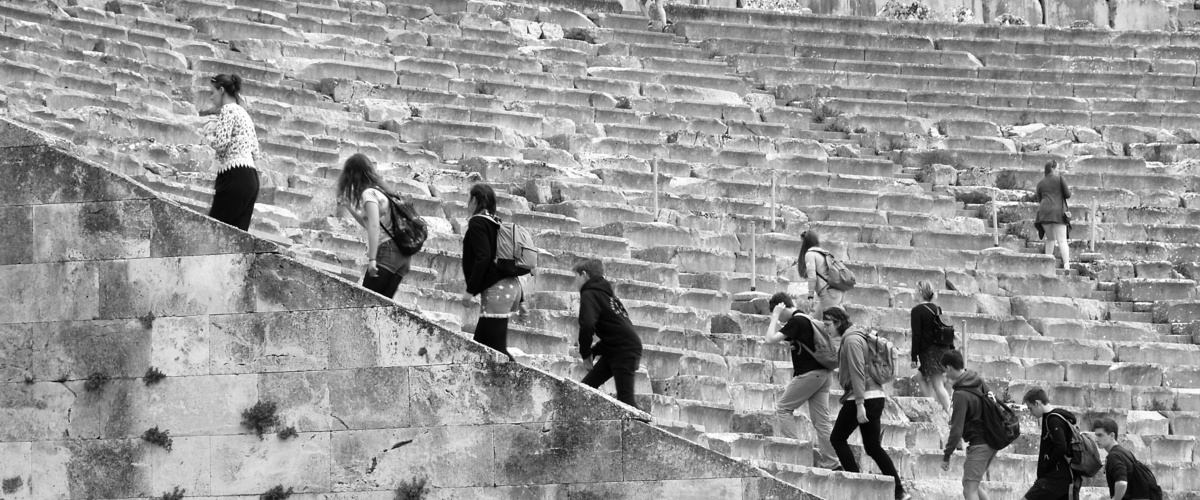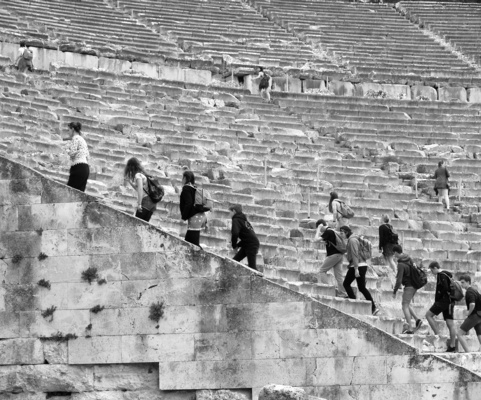Classics


Latin, Greek and Classical Civilisation combines enthralling history, world-changing literature and subversive philosophical and political ideas. It demands and instills a high degree of intellectual rigour and cultural sensitivity towards our social, literary and historical origins.
The study of Latin and Greek involves logical thinking, precise analysis and lucid expression. Pupils invariably develop an enhanced vocabulary and an ability to write with greater fluency, not to mention a heightened awareness of linguistic processes and cultural heritage.
The study of Classical Civilisation combines literature with art history, archaeology, philosophy, geography, history, sociology and anthropology. Pupils study the languages, history, culture, religion, technology and society of earlier periods and in so doing, they gradually unearth the very foundations of modern life.
4th Form
All pupils study Latin in Lower 4 and Upper 4, using De Romanis Book 1. This exciting textbook is designed to offer a lively and accessible introduction to Latin and the mythological world of the Romans.
In Lower 4, pupils read about the lives and loves of the Roman gods and heroes. By the end of the year, they will have completed up to Chapter 3. They will have covered all noun cases apart from the genitive and dative; the perfect and imperfect tense and noun/adjective agreement.
In Upper 4, pupils cover up to Chapter 6. By the end of the year they will have met all Latin noun cases. They will also meet the present tense, irregular verbs and present participles. Cultural topics include Roman festivals and entertainment. There is a companion website for further information on the De Romanis course.
5th Form
Latin and Greek:
Lower 5 pupils who continue with Latin will continue to follow the De Romanis course. At the start of the year, they will meet the future tense before moving on to Book 2. By the end of the year, they will have completed up to Chapter 8 and will have met Latin pronouns and the pluperfect tense. They will also learn about exciting events from Roman history such as Rome’s wars against Hannibal and the assassination of Julius Caesar.
Those who also study Greek will follow John Taylor’s ‘Greek to GCSE’. The idea is to give pupils a taste of ancient Greek at an accelerated pace alongside their study of Latin. The option of ‘Gratin’ (GCSE Latin and Greek combined) is offered at GCSE.
There is a companion website for further information on the De Romanis course.
Classical Civilisation:
Some Lower 5 pupils pursue a Classical Civilisation course, which does not require knowledge of ancient languages. The first part of the year concerns Ancient Greece while, after Christmas, the emphasis shifts to the Roman world. As they become familiar with the style of GCSE questioning, pupils feel ready to begin their GCSE studies.
They prepare for two papers. The first invites a comparison between aspects of Greek and Roman cultures. The second concerns specific aspects of the literature and culture of either Greece or Rome. Both papers combine literary sources (in English translation) with archaeological evidence and visual material.
Classical Civilisation - how it works and what you will study
Studying Classics in L5
6th Form
The Classics department is proud to offer a 6th form environment in which pupils are encouraged to be scholarly and intellectually curious learners. Our approach is supportive and encouraging, our pupils know that we are always on hand to guide and offer extra help where needed.
We follow the OCR A level courses in Latin and Greek. Both subjects comprise four papers, all of which are taken at the end of the two-year course. Two papers focus on translation and comprehension skills; two papers concern prose and verse texts. In Latin A level, texts are read in the original languages, alongside a wider selection of reading in translation, allowing for a greater and broader understanding of the historical and literary context in which such important texts were composed.
For examination in 2025-2026, the Latin texts may include part of Cicero’s Pro Caelio, the great orator’s defence of a man who is accused of the attempted murder of the notorious socialite Clodia. You will also read extracts from Tacitus’ Annals XIV in which the dastardly emperor Nero plots to murder his own mother. Some poetry will sit alongside this rhetoric and history. You will read extracts from Juvenal’s Satires, including his diatribe against the women of Rome. If you are interested in finding out more about these authors then listen to Natalie Haynes’ podcasts on Cicero, Juvenal and Agrippina.
Classical Civilisation:
Classical Civilisation focuses on the civilisations of Greece and Rome, and is a wide ranging subject involving the study of ancient literature, art history, politics, philosophy and history. You don’t need to know any languages, all the literature is in translation. Most importantly it doesn’t matter if you haven’t studied the Greeks and Romans before, all you need is an interest in the ancient world and its cultures. UCL recognises Classical Civilisation as a facilitating subject and Cambridge recommends it for those interested in studying the arts and social sciences.
The A Level course covers three areas of the Classical World:
The World of the Hero concerns the works of Homer and Virgil, epic poets of the Greek and Roman world. The Iliad stands at the beginning of the Western literary canon, the greatest telling of the tragic and bloody climax to the ten-year war at Troy. Virgil’s Aeneid, a patriotic epic, written to honour the emperor Augustus, considers Aeneas’ journey to Italy, and the future foundation of Rome.
The Culture and the Arts topic concerns the cultural response of 5th Century Greece to their victory over the Persian Empire. In ‘Invention of Barbarian’ you will not only study the Greco-Persian wars but also ancient Greek art and literature. You will look at the portrayal of the barbarian in Greek art and in Greek theatre. You will study the Amazons and the child-murdering witch, Medea. Most importantly, this course goes beyond the confines of Europe and you will also study the reality of ancient Persia (modern Iran).
Beliefs and Ideas involves the consideration of the philosophical ideas and political ideals of the Late Roman Republic. One of the most exciting times in western history, it was a period of considerable
political upheaval, which eventually led to a bloody civil war and the rise of the emperors. An exploration of three very different political figures from this period, Cato, Julius Caesar and Cicero, unveils aspects of this tumultuous, and significant, half-century of Roman history and politics.
All three A level papers encourage in-depth study of the Classical world, alongside some modern scholarship and more current academic publications.
The Classics department offers a variety of co-curricular opportunities in the 6th form. ‘Colloquium’ is the senior Classics society which meets fortnightly to discuss a wide variety of topics inspired by the ancient world. Talks are led by pupils and the atmosphere is erudite but informal. We also run a weekly Greek reading club for those who wish to expand and continue their experience of the language beyond GCSE. Helping to run ‘Herculites’ the Junior Classics society offers leadership experience and the chance to be mummified in toilet paper!
Link to relevant external exam boards
Owing to extensive reform over the next two years, there is a large number of relevant links. Information is arranged by year of examination:
|
GCSE: 2018 OCR GCSE Classical Greek J292 |
Alevel: 2018 OCR Alevel Classical Greek H444 |
http://www.ocr.org.uk/qualifications/as-a-level-gce-latin-h043-h443-from-2016/
